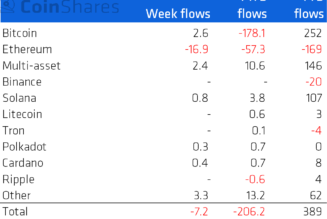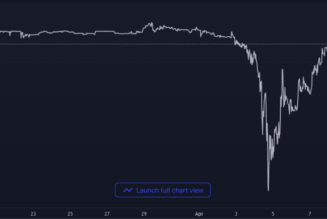
There are a lot of odd holidays in the calendar. My personal favourite is National Peanut Butter and Jelly Day, celebrated annually on April 2nd. It falls the day after April Fool’s Day, which, without sounding too miserable, I was never really entertained by. One holiday that is far from a joke, however, is May 9th – National Lost Sock Memorial Day, a time for us to “honour all the socks that are no longer with us”.
The reason I discuss such wacky holidays is that I was surprised to note that March represents Fraud Prevention Month in Canada. Upon originally seeing this, I thought was a little over the top. Then, I thought about the harm fraud can cause and looked into the numbers. Based on the Canadian Anti-Fraud Centre (CAFC), $379 million were lost to scams and fraud in 2021 (up 130% from 2020) in Canada alone.
Of course, cryptocurrency is often lambasted for its wild-west terrain, which facilitates the widespread duping of consumers. While security in the space is improving, there is no getting around the fact that one still needs to be extremely prudent – CNBC reported in January that scammers made off with a colossal $14 billion in 2021. So, despite the improving security, that still represents a rise of 516% from 2020 (largely due to the growth in size of the space, especially DeFi).
To get an insider’s thoughts on fraud in crypto, we caught up with Justin Hartzman, CEO of CoinSmart, the Toronto-based cryptocurrency exchange and one of the few fully regulated trading platforms in Canada. Founded as recently as 2018, Coinsmart has grown rapidly and, as of Q4 of last year, is now a publicly traded company. Given they have come of age at the same time that crypto has breached into mainstream consciousness, they are in a unique position to opine on the scourge that is fraud in crypto.
Cointext: Coinsmart sticks to the bigger market cap coins, however there are certain exchanges who list a much more extensive selection, some of whom turn out to be scams. Do you think these exchanges should do more to vet coins before listing them, or is that for the individual investor to do?
Justin Hartzman: Absolutely, if you are in the business of providing a trading platform for cryptocurrencies, you have got to do an extensive KYP (know your product). Some of the largest exchanges don’t do a good enough job at this, exposing their users to projects that are either scams, or simply terrible investments. We try very hard to only list coins that are legitimate projects with real use cases, dedicated teams, and high liquidity.
CT: Anonymous teams are obviously quite common in cryptocurrency. Does this concern you at all from an investment point of view, with regards to a heightened chance of scams?
JH: Anonymous teams are ultimately part and parcel of the cryptocurrency industry. There is of course an added risk in investing in projects without an identifiable team, but equally, plenty of projects have exit-scammed in the past, or lost 99% of their value, while having their team doxxed. As with anything in the crypto space, extensive research is needed before investing in any given project. It’s also worth mentioning that anon devs still carry reputations and so part of an investor’s research should always be to thoroughly vet a project’s team, be aware of previous projects they have been a part of and whether they were successful.
CT: Would you advise people to withdraw their funds from exchanges and to store in cold wallets for security?
JH: Anyone who is a long term investor in digital assets would be wise to do the required research and take custody of their own coins. Keeping coins on an exchange will always carry a semblance of risk, and although that risk is mitigated by using exchanges that have strong track records of security, there is always a non-zero chance of a potential hack. The most secure way to hold your digital assets will always be in a cold wallet.
CT: Do you think scams are given too much publicity in crypto, or that they are not as prevalent as a lot of people make them out to be? How damaging to the reputation of the crypto industry do you think scams are?
JH: Scams in the crypto industry certainly do get a lot of publicity and this can, of course, be damaging to the industry’s reputation as they are unfortunately quite prevalent. The decentralised nature of cryptocurrency makes running a scam particularly easy. They are, however, also quite easily identifiable, and so the onus is on the investor to do the proper research to avoid these projects. Scams, of course, do happen in almost every sector of the economy, but with nowhere near as much publicity as crypto scams achieve. As long as there is money or capital involved, there is always going to be risk involved.
CT: What would you say to novice investors who are hesitant to start investing in the crypto space for fear of being duped? Does one need to be a tech-savant to stay safe in the space?
JH: Don’t invest outside of the top 10 coins. In fact, if you’re new to digital assets and are overwhelmed at the choices on offer, you should be sticking with just Bitcoin (BTC) and Ethereum (ETH). Both of these coins have survived multiple crypto cycles, have been around for years and are, without a shadow of a doubt, *not* scams. Investors run into trouble with scams when they decide to start investing in low cap coins with no price history, no use case and no dedicated team with a track record of success. Stick to the blue chips and you’ll be fine.
CT: Would you have any advice for avoiding hacks? Is simple 2FA enough?
JH: The best way of avoiding hacks is to take custody of your own coins in a cold storage wallet. If this is something an investor deems too technical, then keeping the coins on a very reputable exchange with a strong history of security, with security features such as 2FA (Google not SMS), email confirmations, etc, is your next best bet.
CT: Would you give any advice on how to identify cryptocurrencies that turn out to be scam coins?
JH: What makes this difficult is the fact that a lot of crypto projects don’t start off as scams, but turn into one as the original roadmap of the project doesn’t materialise. Team members abandon their projects, cash out their reserves, plummeting the price and leaving investors with nothing. The best way to avoid this is by avoiding coins outside of the top 10-20, at least until a time when an investor can better identify good projects vs bad.
As a rule of thumb though: avoid meme coins. Avoid low cap coins. Research a project’s use case. Always research the team – What’s their track record? Where did they work previously? If they are anonymous, were their previous projects successful? Always review the tokenomics before investing (what is the emission rate, how much of the total supply do the team own, how much is VC owned, when does team + VC vesting end) – if a project has the majority of its tokens dedicated to the team and private investors, with a very short vesting period, then this will lead to persistent selling pressure and will therefore be a bad investment. And if it sounds like it’s too good to be true, it definitely is.
CT: Is there any recourse or legal framework for those who get scammed?
JH: This depends on the type of scam an investor has fallen for but for most, there is very little that can be done given the decentralised nature of crypto. Once you’ve sent money to a scammer, that money is most likely gone, meaning that it’s imperative to always do extensive research on any project before sending funds to an address.
[flexi-common-toolbar] [flexi-form class=”flexi_form_style” title=”Submit to Flexi” name=”my_form” ajax=”true”][flexi-form-tag type=”post_title” class=”fl-input” title=”Title” value=”” required=”true”][flexi-form-tag type=”category” title=”Select category”][flexi-form-tag type=”tag” title=”Insert tag”][flexi-form-tag type=”article” class=”fl-textarea” title=”Description” ][flexi-form-tag type=”file” title=”Select file” required=”true”][flexi-form-tag type=”submit” name=”submit” value=”Submit Now”] [/flexi-form]










Tagged: Crime, crypto blog, Crypto news, Crypto regulation, cryptocurrency, Exchanges